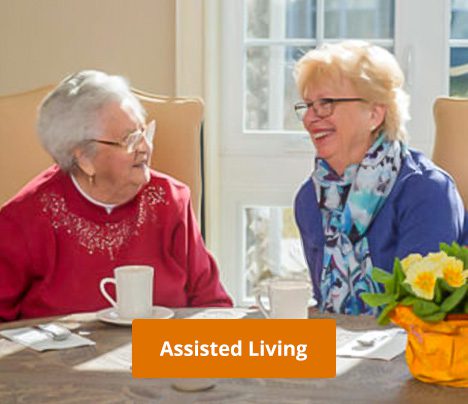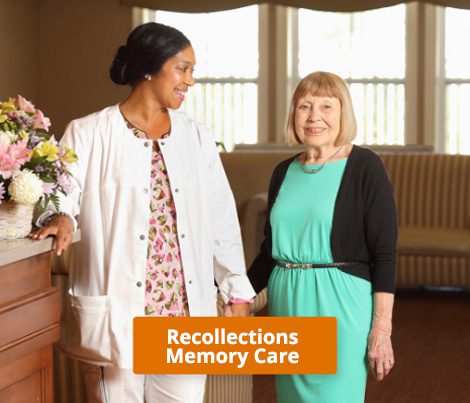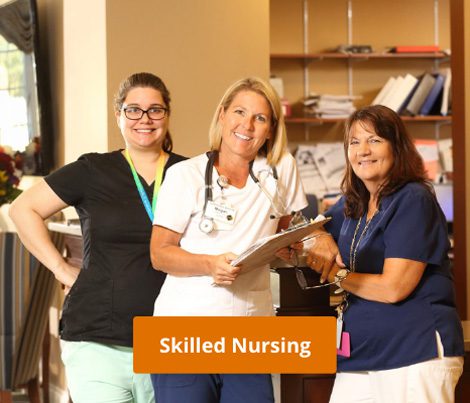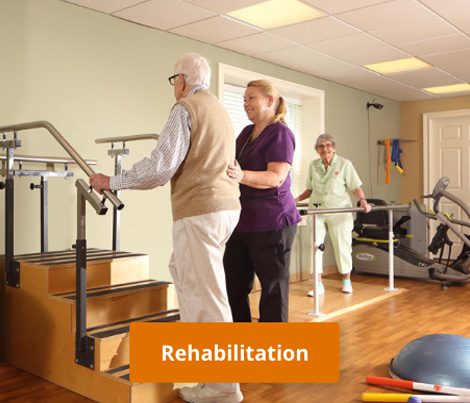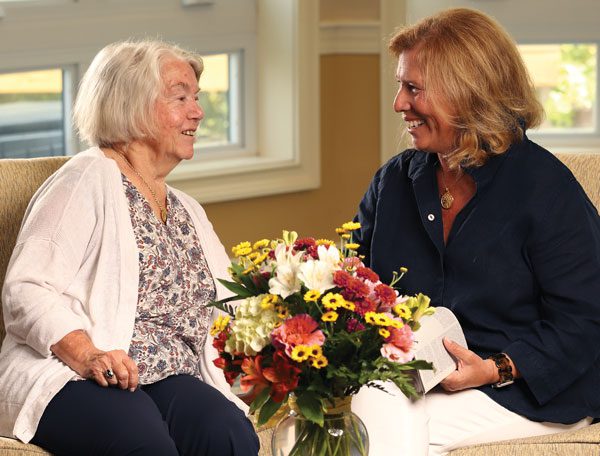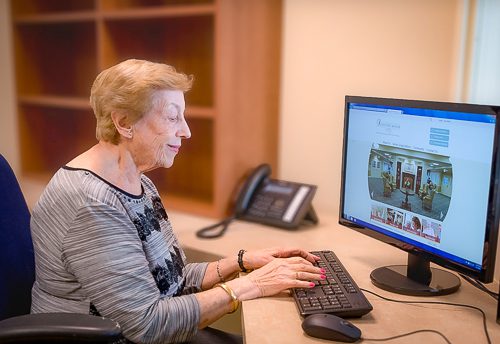“What is level 2 care?” (and more assisted living FAQs)
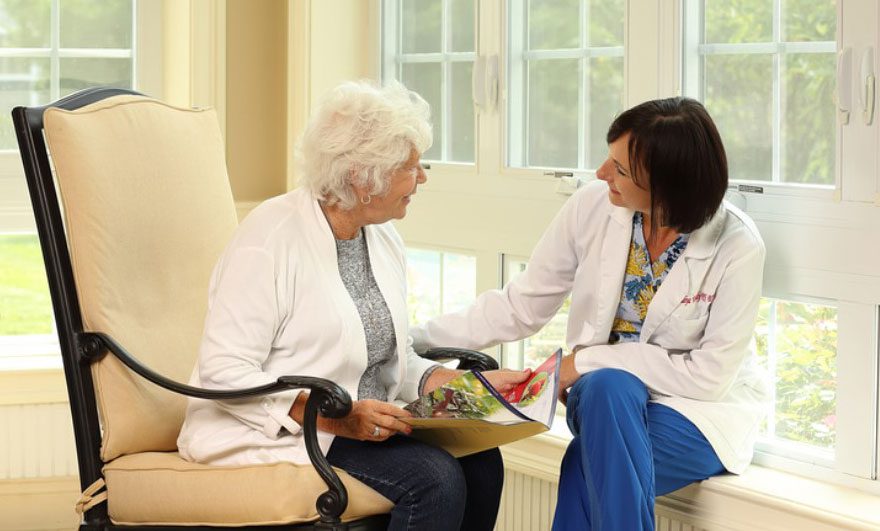
Hear from the experts: answers to 10 frequently asked questions about assisted living.
 When you’re researching senior care options for yourself or a loved one, the process can bring up a lot of questions.
When you’re researching senior care options for yourself or a loved one, the process can bring up a lot of questions.
1. Is there a difference between assisted living and senior living? What about memory care assisted living and independent living?
Assisted living residences are residential communities with apartment-style living, where seniors can receive assistance with the “activities of daily living” (ADLs), such as dressing, bathing, and managing medications. Assisted living communities offer a variety of social programming, dining, and apartment options, all designed to accommodate seniors’ needs.
Senior living and assisted living are sometimes used interchangeably. Senior living is an umbrella term that can refer to many residential care options for seniors. (Sunnyside Manor Senior Living offers assisted living, memory care, long-term skilled nursing care, and short-term rehabilitation.)
Memory care, or memory care assisted living, refers to assisted living that is specially designed for people with moderate to severe memory loss. You can learn more about the difference between memory care and assisted living here.
Independent living typically refers to apartments offered in a continuing care retirement community with dining plans and community features, but no care services.
2. How do I know when it’s time for assisted living?
Generally, it’s best to move to assisted living before there’s an emergency. Making the move when your loved one’s situation is relatively stable gives everyone the gift of time, choice, and flexibility.
3. What are levels of care? What is “level 2” or “level 3” care in assisted living?
Levels of care refer to the amount of assistance a resident needs to be well-supported while staying as independent as possible. Generally, levels are care based on assistance required with ADLs (activities of daily living). These levels are part of how a community determines the monthly fee.
So, “level 2” or “level 3” care won’t mean the same thing at every community. Be sure to ask what each level includes at each community you visit, so that you can find just the right balance of care services for your loved one.
4. What happens if care needs change after moving to assisted living?
It’s normal for a senior’s care needs to change over time. Sometimes, care needs change for the short term, like needing more assistance while recovering from an illness or procedure. Or, care needs may change for the long term, as can happen with severe memory loss, or conditions that require the more intensive medical supervision found with long-term skilled nursing care.
In a standalone assisted living residence, this may mean adding home care services or moving to another residence that offers a higher degree of care.
At Sunnyside Manor, residents make use of our continuum of services (assisted living, memory care, long-term skilled nursing care, and short-term rehabilitation), with a transition team in place to help coordinate changing care needs.
5. How are medical emergencies handled in assisted living?
At Sunnyside Manor, we have emergency call systems in resident rooms and throughout the building. Care staff – including nurses – are onsite 24/7, and specially trained to respond to medical emergencies. And of course, emergency medical services will be called when needed. Resident families are notified any time there is an emergency.
6. How is assisted living regulated?
Assisted living is regulated at the state level. Regulations include staffing requirements, the types of services that can be offered, general safety and hygiene protocols, and contract administration. In New Jersey, assisted living is regulated by the Department of Health and Senior Services.
7. What are assisted living staffing ratios?
Staffing ratios are just what they sound like: the ratio of care staff to residents. These ratios are important because they can help gauge whether there are enough people available to provide care. A lower ratio means there are more staff available to care for residents.
While the minimum staffing ratio is set by the state, staffing ratios will vary from community to community.
8. Is assisted living safer than being at home?
In an assisted living community, extra help is always just around the corner, from getting ready in the morning, to managing medications, to assistance overnight. Plus, assisted living communities are designed to be easily navigated by seniors and have safety features in apartments, restrooms, and throughout the community.
Additionally, assisted living provides a built-in network of peers, and a variety of easily accessible options for socializing, entertainment, and learning. Studies repeatedly show that social seniors have better overall health and a better quality of life.
9. Can people live in assisted living for a short time? Can you have a trial stay in assisted living?
Yes! Short-term stays in assisted living are common. Families may choose short-term stays, also known as respite care or respite stays, when a caregiver needs extended time for travel, rest, and to tend to their own health.
Trial stays are available, too. We recommend that any short-term stays last at least a few weeks to get a feel for what life is like in the community. Learn more about respite care here.
10. How does the move-in process work?
When you decide that assisted living is the right choice, the move-in process begins. The first step is a a health assessment by our nurse. We’ll help coordinate the paperwork and communicate with your loved one’s physicians, so that the process is smooth, and we have all the information needed to ensure your loved one receives the best possible care.
In the meantime, it’s time to select an apartment and start planning the actual move. You can find our moving resources here:
You can learn more about assisted living by browsing helpful articles on our blog. Or, call 888-696-2052 to speak with one of our experts, or contact us by email here.
Learn More About Why Families Rely On Sunnyside Manor
When you have questions about senior living, we are here to help. Sunnyside Manor offers assisted living, memory care, and skilled nursing and rehabilitation. Learn more about Sunnyside Manor’s resources for caregivers. Whether you’re looking for short-term support or a longer-term plan, begin with our “Getting Started” guide. Please call us at 888-696-2052 to speak with a senior living expert.
Sunnyside Manor, located in Wall NJ, is the area’s premier family-owned senior living community. The community features three distinctive neighborhoods: Independence ‘Plus’ Assisted Living, Recollections Memory Care, and Long Term Care & Sub-acute Rehabilitation. Respite stays and palliative care are available in all neighborhoods.

